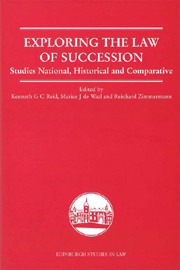Book contents
- Frontmatter
- Contents
- Preface
- List of Contributors
- List of Abbreviations
- Table of Cases
- 1 A Comparative Overview
- 2 Compulsory Heirship in Roman Law
- 3 Succession Law in Scotland – a Historical Perspective
- 4 Succession Law in South Africa – a Historical Perspective
- 5 Freedom of Testation and the Ageing Testator
- 6 Testamentary Conditions and Public Policy
- 7 Forfeiture Clauses and Events in Scots Law
- 8 Revocation of Wills by Changed Circumstances
- 9 Fideicommissary Substitutions: Scots Law in Historical and Comparative Perspective
- 10 The conditio si institutus sine liberis decesserit in Scots and South African Law
- 11 The New Dutch Law of Succession
- 12 Revocability of Mutual Wills
- 13 Succession Agreements in South African and Scots Law
- Index
10 - The conditio si institutus sine liberis decesserit in Scots and South African Law
Published online by Cambridge University Press: 12 September 2012
- Frontmatter
- Contents
- Preface
- List of Contributors
- List of Abbreviations
- Table of Cases
- 1 A Comparative Overview
- 2 Compulsory Heirship in Roman Law
- 3 Succession Law in Scotland – a Historical Perspective
- 4 Succession Law in South Africa – a Historical Perspective
- 5 Freedom of Testation and the Ageing Testator
- 6 Testamentary Conditions and Public Policy
- 7 Forfeiture Clauses and Events in Scots Law
- 8 Revocation of Wills by Changed Circumstances
- 9 Fideicommissary Substitutions: Scots Law in Historical and Comparative Perspective
- 10 The conditio si institutus sine liberis decesserit in Scots and South African Law
- 11 The New Dutch Law of Succession
- 12 Revocability of Mutual Wills
- 13 Succession Agreements in South African and Scots Law
- Index
Summary
WHAT DOES IT MEAN?
When George Bernard Shaw described England and America as two countries separated by a common language, at least that common language was the principal tongue of the countries in question. One trouble with the conditio si institutus sine liberis decesserit is that it has retained its Latin title. This has perhaps led to a certain fuzziness about the meaning of the rule embodied in the phrase. “Sine liberis” means “without children” – and yet the whole point of the rule is that it directs what is to happen where the institute dies with children.
The circumstances in which the rule may come into effect derive from extremely basic and common parts of will drafting. Take the following example: “I direct my executors to make over to A, whom failing to B, the residue of my estate”. A is the institute and B is the conditional institute or the substitute. If B is a conditional institute, once the bequest has vested in A, B can no longer inherit. If B is a substitute, B can inherit on the institute's death, unless A has disposed of the bequest in lifetime or on death. But in the case of corporeal moveables, mere possession by the institute will suffice to defeat a substitution. The rebuttable presumptions which operate in this field in Scots law are that conditional institution is intended where moveable property is involved and substitution where the subjects of bequest are entirely heritable.
- Type
- Chapter
- Information
- Exploring the Law of SuccessionStudies National Historical and Comparative, pp. 177 - 192Publisher: Edinburgh University PressPrint publication year: 2007

